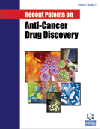-
s Cancer Stem Cells: The ‘Achilles Heel’ of Chemo-Resistant Tumors
- Source: Recent Patents on Anti-Cancer Drug Discovery, Volume 10, Issue 1, Jan 2015, p. 2 - 22
-
- 01 Jan 2015
Abstract
Cancer stem cells (CSCs) refer to a subset of tumor cells with the potential to self-renew and differentiate into different cancer subtypes, including leukemias and solid tumors. Dysregulated gene expression and alteration of critical signaling pathways have been observed in CSCs, compared to low-tumorigenic bulk tumor cells. CSCs are thought to be responsible for tumor onset, self-renewal/maintenance, recurrence, distant metastasis, angiogenesis, and drug/radiation resistance. In recent years, CSCs have attracted a great deal of attention due to the remarkable potential for the development of specific therapies targeting CSCs and the identification of key molecules that play a critical role in controlling the unique features of CSC-enriched populations. During the last several years, a tremendous amount of work has been done on developing new drugs and therapeutic products, such as small molecule inhibitors, antibodies, and small interfering RNAs (siRNAs). These CSC-targeting agents selectively inhibit key components of various intrinsic signaling pathways or specific cell surface markers of CSCs. Many novel therapeutic agents and new molecular targeting compounds have been tested, some of which are currently under investigation in preclinical and clinical trials. In this review article, we provide an overview of the current status of the CSC hypothesis and discuss the various critical signaling pathways and specific cell surface markers involved in the development and maintenance of CSC populations. In addition, we also review various patents and CSC-targeting therapeutic strategies that may eventually lead to eradication of both bulk tumor cells and CSCs.


